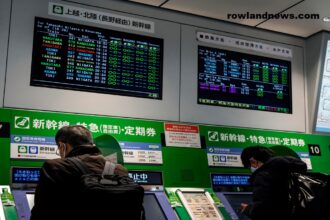In a global landscape dominated by news stories about the U.S., China, and India, it’s easy to overlook the Southeast Asian region’s fastest-growing and most exciting countries: Vietnam.
The country is experiencing rapid economic growth, a youthful and technologically savvy populace, and a growing interest from international investors. Vietnam is emerging as a new frontier in the global investment landscape. If you’re in search of new investment options to broaden your investment options, investing in the Vietnam stock market could be the best future-oriented move that you didn’t realize that you required.
In this comprehensive guide, we’ll go over everything you should be aware of when investing in Vietnam’s stock market, starting from understanding what it is to particular ways to access Vietnamese equity markets as an international investor. Let’s get started.
Why Vietnam?
Before we dive into “the how,” let’s talk about the “why.”
An expanding economy with Possibilities for the Long Term
Vietnam is one of Asia’s most rapidly growing economies over the past decade, boasting an annual GDP growth rate that ranges from 6% to 7.7% (except during slowdowns caused by pandemics). As per the World Bank, Vietnam has transformed itself from one of the countries with the lowest incomes to an economically thriving country with a lower middle income that is driven by its export-oriented manufacturing, a rise in the amount of foreign direct investment and changes to the economy.
A Rising Star in Global Manufacturing
Oft referred to as”China+1″ or ” China+1” location, Vietnam has become a center for businesses looking to diversify their supply chains away from China. Big companies, such as Samsung, Apple, and Intel, have already diversified their operations in Vietnam and are helping to boost the country’s technology and industrial sectors.
A Young and Growing Consumer Market
A median age that is around 32 and an increasing middle class, and technologically-connected population, Vietnam is becoming an ideal market for companies working with a focus on the fields of fintech, retail as well as education and health.
For investors seeking a market with high growth and long-term future potential, Vietnam is checking all the boxes.
How the Vietnam Stock Market Works
Main Stock Exchanges in Vietnam
The Vietnam equity market is governed through two exchanges
- Ho Chi Minh Stock Exchange (HOSE) – The principal exchange at which the majority of big and mid-cap businesses are listed.
- Hanoi Stock Exchange (HNX) – Hosts smaller or mid-sized businesses as well as corporate bonds.
Also, there’s the UPCoM (Unlisted Company Market) (Unlisted Public Company Market), which is a step-up in the process of preparing companies to list their company.
Key Market Indexes
- VN-Index is the Index of benchmarking of the HOSE, which tracks the results of listed major businesses.
- HNX-Index is a performance indicator for the Hanoi Stock Exchange.
- VN30 Index: The index comprises 30 of the largest and liquid stocks listed on the HOSE.
They are useful indicators of market trends as well as the mood of investors in Vietnam.
Can Foreigners Invest in Vietnamese Stocks?
Absolutely! But there are certain restrictions and nuances.
Vietnam permits foreign investors to take part in its stock exchange; however, restrictions on foreign ownership (FOLs) apply in specific industries, such as communications, finance and defense. In some sectors, however, foreigners can own up to 100% of the listed shares.
To invest directly in Vietnamese stocks, investors will have to
- Create a trading account through an authorized Vietnamese broker
- Get the trading number at VSD. Vietnam Securities Depository (VSD)
- The requirements for meeting KYC (Know Your Customer) and meeting the documentation requirements
Additionally, there are alternative ways of investing and we’ll discuss them in the next section.
Ways to Invest in the Vietnam Stock Market
1. Direct Investment via a Vietnamese Broker
This is by far the most direct and efficient way to get access to Vietnamese stocks.
Steps:
- Select a broker that is licensed (e.g., SSI Securities, VNDirect, HSC).
- Input your identification/passport number, fill out the application form, as well as your bank information.
- Obtain your trading number, provided by the VSD.
- You can fund your account and then start trading.
Many prominent Vietnamese brokers offer websites in English and provide international investor assistance.
Pros: Access to local stock
Cons: Additional documentation to complete, currency conversions, and limitations on markets caused by FOLs
2. Vietnam-Focused ETFs
If you’re looking for a more hands-off approach, ETFs (Exchange-Traded Funds) provide an excellent opportunity to gain exposure to Vietnamese stocks without establishing an account with a local brokerage.
Many of the top Vietnam ETFs are:
- VanEck Vectors Vietnam ETF (VNM) – Tracks an extensive range of Vietnamese businesses.
- DBF MSCI Vietnam ETF offers an exposure to the MSCI Vietnam Index.
- The iShares MSCI Frontier and Select EM ETF includes Vietnam as part of its larger allocation.
They trade internationally on exchanges such as the NYSE and are available to investors from all over the world via brokers like Interactive Brokers, TD Ameritrade , and Fidelity..
TIP: ETFs can be ideal for avoiding the foreign ownership limit and also provide an instant source of diversification.
3. Mutual Funds and International Investment Platforms
A few global asset managers, as well as mutual funds, offer exposure to Vietnam through their emerging markets portfolios. Examples include:
- Fidelity Emerging Asia Fund
- T. Rowe Price Frontier Markets Fund
- Eastspring Investments Vietnam
If you’re investing in nations such as India, Singapore, or the U.S., check with the regional AMC and financial consultant to determine if they can provide Vietnam allocations through the feeder fund.
4. American Depositary Receipts (ADRs)
A small percentage of Vietnamese firms are listed as ADRs. However, this could change shortly. Currently, mutual fund and ETF options are more accessible to international investors.
Popular Vietnamese Stocks to Watch
If you’re thinking of taking it directly, here are the top performing and famous Vietnamese businesses:
- Vingroup (VIC) A grouping of businesses that deal in automobiles, real estate (VinFast) and retail.
- Hoa Phat Group (HPG) – Vietnam’s leading producer of steel.
- FPT Corporation (FPT) – A vital IT and technology service provider.
- Vietcombank (VCB) is one of Vietnam’s biggest commercial banks.
- Masan Group (MSN)is a consumer products and retail giant.
They are often included in Indexes and ETFs for Vietnam. Many are at the forefront of Vietnam’s economic transformation.
Taxes and Fees for Foreign Investors
Capital Gains Tax
Vietnam is a country that imposes a uniform 0.1 percent tax on the value of shares (regardless of the amount of loss or gain) in lieu of taxes on profits directly.
Dividend Tax
A 5percent withholding tax is imposed on dividends of foreign investors.
Brokerage Fees
Be prepared for commissions on trading from 0.15 percent to 0.35% for each transaction , based on the broker. Some brokers charge account maintenance or fees for currency conversion.
Make sure to read the fee schedules of the broker you use before transferring funds to your account.
Risks and Challenges to Consider
Similar to any other emerging market, investing in Vietnam has its risks.
1. Regulatory and Political Risk
Vietnam is a socialist one-party republic. Although the government has adopted market-oriented reforms, sudden policies or interventions remain possible.
2. Market Liquidity
Vietnam’s market is still expanding; however, its liquidity may be lower than that of other markets with more advanced infrastructure. Certain stocks may have limited daily trading volumes.
3. Foreign Ownership Caps
It is possible that you will not be able to purchase specific stocks when the foreign ownership limitation (FOL) is exceeded. It could restrict access to blue-chip companies.
4. Currency Risk
If you’re planning to invest in the currency VND (Vietnamese Dong) take note of the fluctuations in exchange rates. Tools for hedges might not be accessible through every broker.
However, investors who adopt a diversified approach can reap high reward opportunities.
Read Also: How to Invest in the Hong Kong Stock Market
Real-World Example: How Ankit Built His Vietnam Portfolio
Ankit, a 34-year-old investor from Bangalore, became interested in Vietnam’s rapid growth. He began by investing through VanEck Vectors Vietnam ETF (VNM). VanEck Vectors Vietnam ETF (VNM) through his Interactive Brokers account.
Then, he created an account at SSI Securities after reading reviews about brokerages online. It took him a couple of weeks to receive his code for trading, but once it was active, he began buying shares in FPT Corporation as well as Vietcombank.
After two years, Ankit’s Vietnam portfolio is now up by 24 percent. And, most importantly, he claims, “I feel like I’ve invested in a country that’s on the rise–and that’s exciting.”
Step-by-Step: How to Start Investing in Vietnam
- Select your method: ETF, mutual funds, and direct investments.
- Register an account with the help of an international broker or a Vietnamese broker.
- Complete KYC ID, address proof and investor’s code (if necessary).
- You can fund your account by transferring USD or VND depending on the broker.
- Begin small and then diversify. Don’t become overly invested in a single stock or sector.
- Monitor and Rebalance: Track market changes and adjust as needed.
Conclusion: Is Vietnam Worth Investing In?
As long as you’re patient, educated, and strategic.
Vietnam offers a unique blend of youth, growth, and political stability, along with a willingness to accept foreign investment. The country may not have the scale of China or the glitz of India, however the momentum for its growth is evident.
If you’re an investor with a longer-term perspective and an interest in developing market,s Vietnam may be Southeast Asia’s most sought-after jewel.
Ready to Explore Vietnam’s Investment Potential?
If you’re interested in the next great investment opportunity in the world, Vietnam deserves a serious review. Begin small, learn to diversify your portfolio.
If you’ve started your Vietnam venture — give us your experiences or suggestions in the comment section below!
Helpful External Resources:














